|
RIPSTER REVIVALS #18
Also known as The Getting Away With Murder Club in honour of the column which ran in SHOTS for 200 issues and to which these ‘occasional’ ramblings bear a striking resemblance.
|
Family Business
Only a really vicious bout of flu prevented me from attending one of the crime-writing social events of the year, the annual launch of the new ‘Dick Francis’ novel, in this case Dark Horse [Zaffre] showing that the going continues to be good for the family business as continued by Felix Francis.
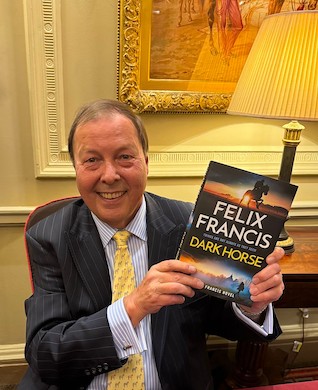
Dark Horse features a very welcome return of the most endearing character from the Francis stable, Sid Halley, who first appeared in Odds Against back in 1965. That book was favourably reviewed in the Oxford Mail by that doyen of crime fiction reviewers (and later notable author of spy fiction) Anthony Price. It seemed only fitting therefore that Shots, in the tradition of continuing family businesses, should ask James, son of Anthony, to review it.

Catch-Up
I have been lax this year in catching up on the work of chums I usually only see at CrimeFest conventions (now sadly of blessed memory). One writer whose company I greatly enjoy is Alex Shaw, an acknowledged master of the violent, jet-propelled international thriller which at times make Jason Bourne look like the innocent plus-one on a SAGA cruise.
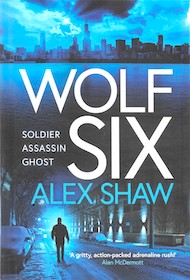
Wolf Six [Boldwood Books] is the first in a very promising new series for Alex Shaw, although I believe the sequel, Kill Code, is now published. Ruslan Akulov is the eponymous hero; a Ukrainian raised in Moscow who has been conscripted into a special forces unit with a fearsome reputation known as The Werewolves. Disillusioned with working for the Kremlin, Akulov goes freelance, plying his trade as a professional assassin. In a breathless opening sequence, Akulov is caught up in an armed bank robbery in Chicago and takes out the robbers despite odds of eight-to-one against. Unfortunately this irritates (somewhat) the Russian Bratva (Mafia) who were behind the robbery and Wolf Six’s problems multiply as his professional ‘broker’ is kidnapped, his hit on a drugs baron is thwarted by the CIA and he is forced to revisit his violent past in eastern Europe. The action zips at a ferocious pace from America to Kyiv, to Havana and back to Washington, pausing only to reload and for elderly readers such as myself to check their blood pressure or to ask their Austrian stockbrokers to buy more shares in Glock GmbH.
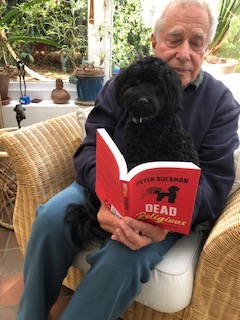
At the opposite end of the Richter Scale, a satisfying read for both gentlemen and black poodles of leisure is Peter Buckman’s latest in his ‘Pumpernickel Mysteries’ series, Dead Religious [Word of Mouth Books], as witnessed here by the author himself. This latest case for semi-retired lawyer Leo Wengrowski and his scene-stealing poodle Pumpernickel – gloriously assisted by the uber-cynical crime reporter Dennis – involves the death of a British Museum creator and missing Jewish historical artefacts and comes with some snappy one-liners Groucho wouldn’t have turned down. One reviewer has already described this series as ‘Jilly Cooper meets Richard Osman’ which is a height difference I will never be able to unsee.
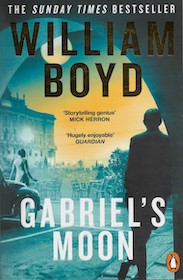
I was ridiculously proud that my novel Mr Campion’s Christmas had made the long list for the inaugural Spymaster Award for best spy novel of 2024, in early September, not to mention being over-awed by the other titles in contention. In the end, as I predicted, the title was taken by William Boyd’s Gabriel’s Moon, although at the time I had not read it, only rave reviews of it.
It was inevitable that it should be the one novel (now a convenient Penguin paperback) I would take on my recent vacation in Italy – I only ever take one novel as there is so little time between restaurants and wine tastings. I was not disappointed as it is a wonderfully well-written tale of a vulnerable young man stumbling into the confusing and manipulative world of espionage in the early 1960s. Whilst part of the timeline of Gabriel Dax’s story overlaps with that of my adopted hero Albert Campion, William Boyd manages to resist the temptation, where I could not, to make sly, but endearing, references to those seminal cultural works Dr No and The Ipcress File which appeared almost simultaneously in the Autumn of 1962.
From the TBR Pile
I have never been quite sure how to define a picaresque novel. I know the expression comes from the Spanish picaro,meaning a charming rascal, and that the classic example is Cervantes’ Don Quixote (no, me neither) and that it is a phrase often applied (though not, I think by his publishers) to the writing of Geoffrey Household whose work over a long career (1900-1988) I have always enjoyed.
I was delighted to discover a Household title I had somehow missed, Red Anger from 1975, most of which is set, supposedly, in 1964 in an England riddled with paranoia about spies and defectors and if any of his books can be described as ‘picaresque’ this one qualifies. As in most of his thrillers, Household’s hero has a bicultural heritage, in this case English and Romanian, though Adrian Gurney abandons his English identity and pretends to be a defector from a Russian fishing trawler, swimming ashore claiming to be Ionel Petrescu, which brings him, inadvertently, to the attention of numerous intelligence organisations. Gurney/Petrescu is at one point told to pretend to be Portuguese and adopt the name Willie, and the names of additional characters add further to the confusion: there’s a missing English security officer, Alwyn Rory, suspected of helping a defector called Mornix to defect, a shady spy called Marghiloman, a femme fatale called Rachel Iwyrne, a hippy squatter (surely out of time even for London) known as Ciampra and an impressive American grande dame called Eudora, now retired to Devon but still holding the left-wing views she had held when participating in the Spanish civil war.

Gurney/Petrescu/Willie finds himself helping the ‘missing’ Alwyn Rory to clear his name, or at least avoid capture by the police or discovery and possible assassination by the CIA and/or the KGB. This involves much travelling across the country by bus, train, horse and finally on foot, at one point avoiding a police road block by dressing in drag as ‘Lady Enid Paddington-Benzance’ out for a ride across Devon with her groom and also swimming out to a derelict hulk of a boat (with only the crudest of toilet facilities) where the fugitive pair hole up for some time, existing on ginger biscuits.
There’s the ever-present Household theme of characters seeking redemption and, of course his characters blending with the countryside, in this case the Marlborough Downs (for the most unlikely rendezvous in spy fiction), and its animal inhabitants. A polecat ferret is used effectively as a threatening weapon, as is a herd of patient bullocks against a CIA agent well out of his comfort zone.
In the end the situation is resolved (or is it?) by a suicidal gunfight and the reader might wonder what all the fuss was about, but Red Anger certainly provided some colourful – picaresque? – characters and fantastical scenes along the way.
*
At several points while reading The Crossing (1975) by that under-sung master of the spy story Ted Allbeury, I was sure I had picked up a non-fiction history of twentieth century espionage by mistake.
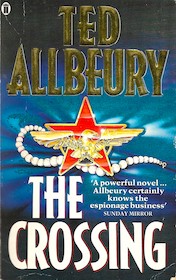
The ‘crossing’ of the title is, physically, as fans of Bridge of Spies will have guessed, the Glienicke Bridge in Berlin, the scene of many a Cold War spy swap, but the title also refers to the crossing of loyalties and identities in a story which stretches from the days of the Petrograd Soviet in 1917 to the famous exchange of Colonel Rudolf Abel for Gary Powers – and who knows who else...
Like all Allbeury novels, the espionage background and tradecraft are completely believable as are the characters and however devious they are, or are forced to be, the author always treats them with empathy and humanity.
Back in print – and why not?
I first met film critic Barry Norman almost twenty years ago, through his wife Diana, who wrote excellent historical mysteries under the name Ariana Franklin. Barry would accompany her to crime-writing events in London and Cambridge but never once, to my knowledge, promoted his own thriller-writing career which had begun in the 1960s.
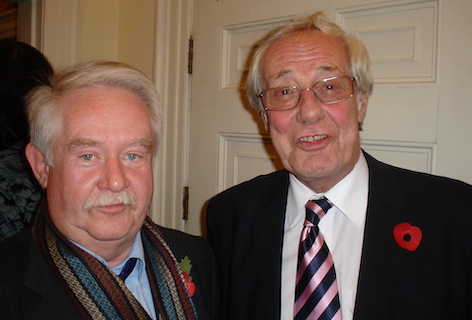
Being the son of film director Leslie Norman (whose 1958 Dunkirk is still worth viewing despite Christopher Nolan’s more recent epic), it was inevitable that Barry would drift into the world of movies, which he did with great success, becoming the nation’s favourite film critic on television and in many books on the subject. He also wrote about his other passion, cricket, but less well-known are his novels, particularly a brace of spy thrillers written at the height of the spy-fi boom in 1967 and 1968, The Matter of Mandrake and The Hounds of Sparta, which were out of print and really quite rare for many years, until now.
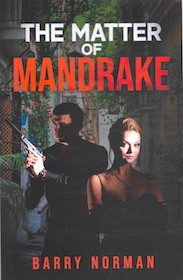
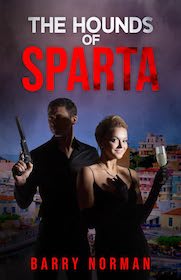
Thanks to those irrepressible people at Brash Books of California, five of Barry’s novels are now back in print, not just his debut spy thrillers, but later crime novels from the early 1990s. Mandrake and Sparta will probably be the most sought after by fans of the genre in its British heyday. They are both quintessentially thrillers of the Sixties, liberally using what would still have been exotic foreign locations for many readers, and of course the females (often referred to as ‘birds’) cannot help but throw themselves at the hero, the mild-mannered, out-of-his depth Paul Baker. A well-travelled journalist, like Barry Norman, Paul Baker stumbles into working for an off-shoot of British intelligence, seemingly unfazed by the need to carry a pair of Browning automatics, one of them concealed in his underpants! Baker is no James Bond and doesn’t pretend to be. In fact he has more in common with that other misfit of spy fiction, Boysie Oakes or ‘The Liquidator’ as created by John Gardner, though not as much a coward. All Barry’s books are shot through with his trade-mark dry (but never cruel) wit never better employed when he touches on the mad world of movie-making and it’s wonderful to see them back in print.
Bourbon Street Blues
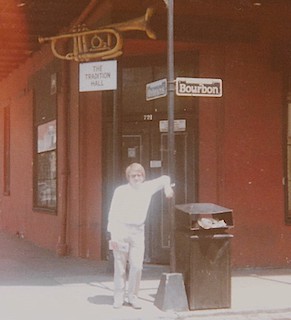
I was positively green with envy following the exploits of my Shots colleagues Mike ‘Tombstone’ Stotter and Prince Ali Karim as they attended the recent Bouchercon convention in New Orleans. This was not only because I have fond memories of The Big Easy even though it is far too many years since I last visited but because of the crime-writing legends they rubbed shoulders with whilst there, and one in particular: Gerald Petievich.

I discovered the novels of former U.S. Treasury agent Petievich about forty years ago, just as I was embarking on my own foray into crime-writing. Several of his books were published here by the New English Library and others I found as American paperback imports at Murder One.
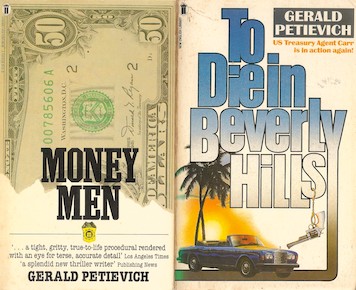
They were tough, cleverly plotted and utterly gripping thrillers which I greatly admired although until a recent conversation with Ali Karim, I had never met anyone else in this country who had read them. I am delighted that Mr. Petievich is alive and well (despite running into the Shots team) and indeed has a new book out this year, which I really must hunt down.
Homework
As a founder-member of the legendary (i.e. totally fictitious) Chianti Crime Festivals more than a decade ago and having established that they were not an elaborate way of including gourmet tours of Italian restaurants as essential ‘research’ expenses in claims made to His Majesty’s Customs and Excise, I am greatly looking forward to attending the totally genuine Venice Noir festival of Italian and British crime-writing in November.
There I hope to share an aperitivo or three with Sir Ian Rankin and David Hewson (the mastermind behind the festival) and numerous Italian crime-writers whose work I have admired in translation such as Carlo Lucarelli. Before then, of course, I will be doing my homework by reading John Banville’s new historical novel Venetian Vespers [Faber] and naturally David Hewson’s latest, The Four Deadly Seasons which is published by Bloodhound Books in October.
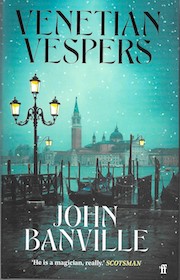
Ciao for now,
The Ripster.